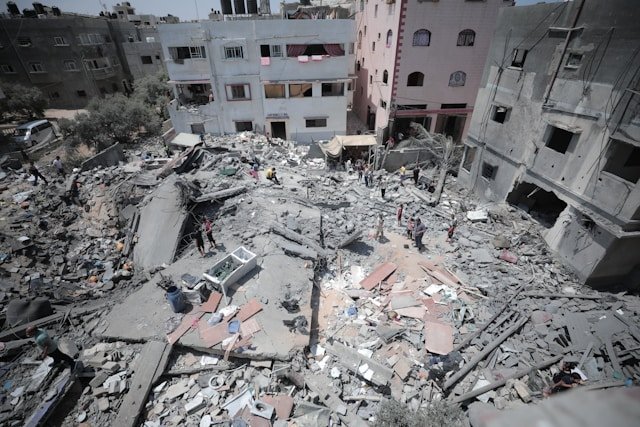Israeli air attacks kill 84 in northern Gaza amid tense ceasefire negotiations in Qatar
Israeli air strikes killed at least 84 people in Gaza on Wednesday, as indirect ceasefire talks between Israel and Hamas continued in Doha, Qatar. Medical sources and Gaza health authorities reported that nearly 50 victims perished in northern Gaza, including the heavily impacted Jabalia refugee camp, while others died in Khan Younis to the south.
Rescue workers in Jabalia struggled through piles of collapsed concrete with only cellphone lights to locate the bodies of children and other civilians killed in the bombing. The scene starkly revealed the brutal reality of the ongoing aerial assault.
Al Jazeera’s reporter Tareq Abu Azzoum, reporting from Deir el-Balah in central Gaza, described Israel’s military campaign as “systematic and intensifying,” primarily targeting residential areas to force families to flee and live in makeshift tents. He warned that this displacement may be part of a larger plan to remove residents from northern Gaza.
The attacks persist amid ongoing negotiations facilitated by Qatar, Egypt, and the United States, as an Israeli delegation sought indirect talks with Hamas representatives. This diplomatic effort follows a brief pause in hostilities that allowed the release of Israeli-American captive Edan Alexander.
US Middle East envoy Steve Witkoff conveyed cautious optimism, telling Al Jazeera that “great progress” had been made in truce talks, encompassing both the ceasefire and resuming aid into Gaza. Though hopeful, he gave no immediate timeline for an announcement.
Despite these talks, Israeli Prime Minister Benjamin Netanyahu reaffirmed on Tuesday that Israel would continue its military campaign regardless of a ceasefire agreement.
Since Israel launched its campaign in October 2023, in response to Hamas’s deadly attack on southern Israel that killed over 1,100 people, Gaza has suffered immense devastation. According to Gaza’s health authorities, more than 52,900 Palestinians have been killed, and over 90 per cent of the population has been displaced multiple times due to the relentless bombardments and ground operations.
Embed from Getty ImagesInternational concern escalated this week as food security experts warned Gaza could face famine if Israel does not lift its blockade and halt its military actions. French President Emmanuel Macron openly condemned Netanyahu’s refusal to allow aid into Gaza, calling it “a disgrace” that has precipitated a dire humanitarian crisis. Macron highlighted the lack of medicines, medical access, and the impossibility of evacuating the wounded.
Netanyahu’s office swiftly rebutted Macron’s comments, accusing the French leader of siding with “a murderous Islamist terrorist organisation” and echoing “despicable propaganda.”
Meanwhile, hunger has reached catastrophic levels, with half a million Palestinians on the brink of starvation and one million more facing severe food shortages, according to the Integrated Food Security Phase Classification. Israel has blocked all food, medicine, and essential supplies from entering Gaza for over ten weeks, leaving the population of approximately 2.3 million almost entirely dependent on external aid.
This ongoing blockade, combined with relentless air strikes and ground operations, has decimated Gaza’s capacity to produce food or sustain basic living conditions, pushing the enclave to the edge of a humanitarian disaster.
As indirect ceasefire talks continue in Doha, the situation remains volatile, with innocent civilians bearing the brunt of an escalating conflict that shows no immediate sign of resolution.
